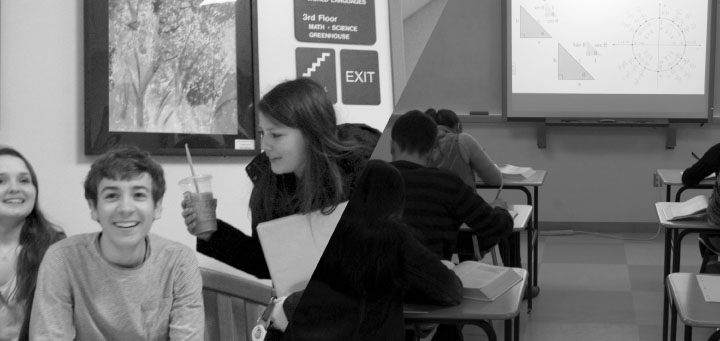Staples offers over 160 courses, ranging from child development to personal finance and marine biology. There are 180 school days in a year and eight periods in a day. It’s a lot. But there are sacrifices, like extended labs instead of Good Morning Staples.
“There is no perfect schedule,” Principal John Dodig said. ““The outcome is great; our kids do well. One of the things we have to live with is that science will not always see Communication Time,” he added.
Commonly, students complain that they are often forced to surrender Communication Time to make room for lab set-up or lab work or note-taking in science classes. Many students say they enjoy the relaxed nature of the show, or informal conversations with teachers.
Sarah Herbsman ’15 said that frequently, her extended science periods are not used for labs but are just 80 minutes straight of normal class and that she, along with the rest of her class, wastes five minutes every extended class period complaining about not watching the morning show.
Along with Hersbman, Jamie Tanzer ’15 also finds that her science periods with Communication Time are not usually used for anything like labs.
“In my sciences classes we use Communication Time just as a longer class period; we don’t really do labs or anything very often,” Tanzer said.
What students may not know is that the decision to cut Communication Time came only after long and thoughtful discussions and that science, overall, needs the time.
“When the schedule that we have currently was first established, one of the compromises that was made was a sort of under-scheduling of science lab periods,” A.J. Scheetz, Science Department Chair, said. “We have far fewer minutes for lab experiences and science than any of the other school districts in our area.”
For example, Darien High School has an eight day rotation where seven periods meet every day. According to Principal Ellen Dunn, twice during this rotation, the science periods are doubled for labs and then honors and AP science classes have an additional double lab period.
Like Darien , Fairfield Ludlowe High School has science classes meeting five times a week and then twice a week, these periods are doubled to make room for labs. And instead of something like Communication Time, Fairfield Ludlowe makes announcements over the loudspeaker during homeroom.
Staples went a different route. The Student Handbook says, “The purpose of the Communication Time period is to create an informed school community, which fosters greater and more effective engagement in the overall life of Staples High School.”
However, science classes are allowed to skip the Good Morning Staples show or community-building class discussions, to ensure that the time in that extended period compensates for lost science time.
Communication Time is highly valued by Staples students and teachers. Even science teacher William Jones regrets that he doesn’t have sufficient time to get through the necessary class work and also watch the morning show in an extended period.
“I wish I could watch Communication Time, not to get to know my students, because I do that anyway, but because I think it’s valuable. But I just can’t take time away from the labs,” Jones said.
Students and faculty alike feel the drawbacks that missing the morning show creates. Claire Saracena ’15 believes that being knowledgeable about what’s happening in the school, such as fundraisers or sports team updates, is vital to feeling connected within the Staples community.
“If we’re part of the school, we should be aware of what’s going on inside of it,” Saracena said.
Communication Time also provides an opportunity for students and teachers to interact in a less strenuous way.
English teacher Brian Tippy values the time allotted to getting to know students within the classroom without the added stress of curricular obligations.
“You get a chance to build relationships with students that are really helpful,” Tippy said.
It’s difficult for some students to accept that the time designated for communication would not be used by science classes in the way in which it was intended.
Although some think it’s a burden to use the extended Communication Time period to work, others see the compromise as worthwhile because it eliminates the opportunity for unfinished class work to become additional homework.
“Well, usually if we don’t finish the lab during class, we have to finish it for homework, so I’d rather just finish it in class where I can ask [my teacher] questions rather than at home” Victoria Finley ’16 said.
No matter the reason for a science class to not be participating in Communication Time, Scheetz trusts that teachers make the best of the extra time, especially since, he said, there are no expectations that science teachers will use Communication Time for communicating or watching the show.
“I’m confident that [science teachers] are using those 15 minutes, that in other classes might be for Communication Time, for instruction,” he said.
Dodig said he recognizes the sacrifices but believes the school has made a good choice..
“Nothing is perfect; nothing is ideal,” Dodig said. “The grass seems greener on the other side until you get there and you find out that you have to spend $10,000 a year on fertilizer.”













































